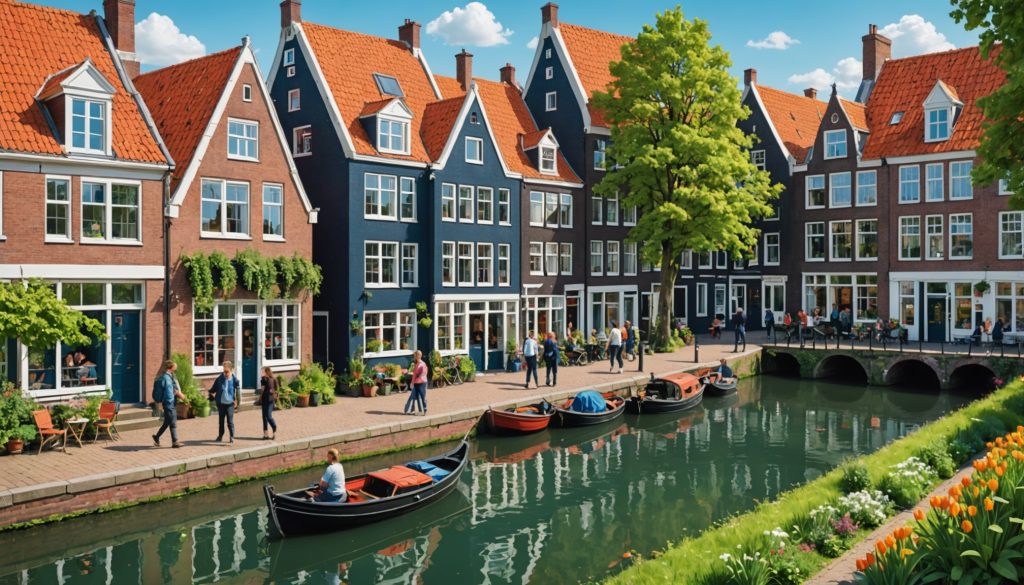Real Estate Investment Opportunities in the Netherlands: 2025 Outlook
Estimated Reading Time: 8 minutes
Key Takeaways
- The Dutch real estate market is projected to grow by 7% in 2025, driven by strong rental demand and economic stability.
- Regional variations indicate the Utrecht region and rural areas will see the strongest growth, while major cities may experience more moderate increases.
- The housing shortage, expected to reach approximately 420,000 homes, continues to drive demand and prices.
- Favorable financing options are available, thanks to falling mortgage interest rates.
Table of Contents
- Market Overview
- Investment Trends & ROI Projections
- Legal & Tax Considerations
- Property Types & Prices
- Risks & Challenges
- Financing & Mortgage Options
- Citizenship/Residency Benefits
- FAQ
- Conclusion
- Call-to-Action
Market Overview
The Netherlands has demonstrated robust performance in the real estate market, characterized by stability and promising growth. In 2025, market dynamics indicate:
- Steady Price Growth: Following an impressive 8.7% increase in 2024, house prices are anticipated to rise by 7% in 2025, attributed to a combination of high demand and constrained supply.
- Regional Performance: Variations in price growth are noted, with the Utrecht region and rural locales outperforming urban centers like Amsterdam, Rotterdam, and The Hague.
Investment Trends & ROI Projections
Investors can expect favorable returns in the Dutch residential property market:
- Growth Drivers:
- Falling Mortgage Rates: Lower rates enhance affordability and stimulate market activity.
- Housing Shortage: A persistent deficit of available homes is driving up prices.
- Increasing Household Incomes: Higher purchasing power boosts demand.
- Sector Performance:
- The rental sector is projected to be the primary growth driver, indicating potential for significant capital appreciation.
- Current trends suggest a focus on acquiring residential properties to capitalize on this growth.
Legal & Tax Considerations
- Property Ownership Laws: Foreign investors can buy property in the Netherlands without restrictions.
- Tax Implications:
- Income from rental properties is subject to taxation.
- Capital gains tax is applicable primarily upon selling residential properties.
Consulting with a tax advisor familiar with Dutch regulations is advisable for investors to optimize tax liabilities.
Property Types & Prices
- Key Property Types:
- Single-family homes
- Apartments and multi-family buildings
- Commercial real estate (less competitive than residential)
- Price Overview:
The average price for residential properties varies widely, with urban centers typically commanding higher prices compared to suburban and rural areas.
Risks & Challenges
While the Netherlands is an attractive investment destination, potential risks include:
- Supply Constraints: The housing shortage is expected to worsen, potentially impacting price stability.
- Market Volatility: Economic fluctuations can impact market conditions, requiring investors to maintain flexibility.
Investors should conduct thorough market research and engage local real estate experts to navigate these challenges.
Financing & Mortgage Options
- Mortgage Availability:
- The market is witnessing favorable conditions with stable or declining mortgage rates.
- Investors are recommended to consider fixed-rate mortgages to hedge against potential future economic uncertainties.
- Financing Strategies:
Leverage existing equity or pursue financing through international banks with experience in Dutch property investments.
Citizenship/Residency Benefits
Investors may also explore opportunities for residency or citizenship through investment, which can be beneficial for those considering long-term stays in the Netherlands.
- Residing in the Netherlands: The Dutch government offers various programs that can lead to residency for investors, which may be appealing for those wishing to actively manage their properties.
FAQ
- Q1: Is now a good time to invest in the Dutch real estate market?
A1: Yes, 2025 presents a favorable environment for investment due to projected price growth and strong market fundamentals. - Q2: What are the best regions to invest in?
A2: The Utrecht region and rural areas, which are expected to experience higher price growth compared to major cities. - Q3: Are there any restrictions on foreign ownership of property?
A3: No, foreign investors can purchase real estate in the Netherlands without restrictions. - Q4: What is the expected rental yield in the Netherlands?
A4: Rental yields can vary, but strong demand in the residential sector suggests competitive returns are likely.
Conclusion
The Netherlands real estate market offers significant investment opportunities in 2025, particularly for those looking to enter the residential rental sector. With a forecasted price increase of 7% and ongoing economic stability, investors can anticipate attractive returns, albeit with caution regarding the existing housing shortage.
By focusing on regions like Utrecht and considering strategic entry points, investors can maximize their long-term value in this promising market.
Call-to-Action
For more in-depth insights into real estate investment in the Netherlands, explore Realty Invest Navigator.

